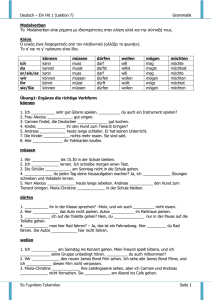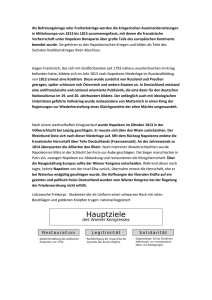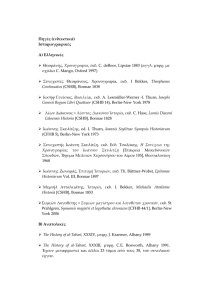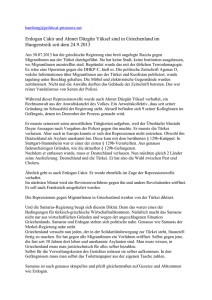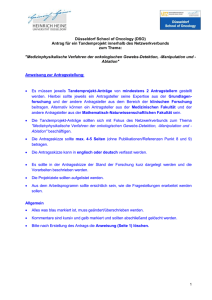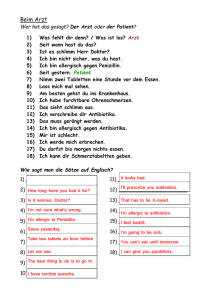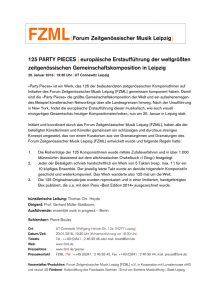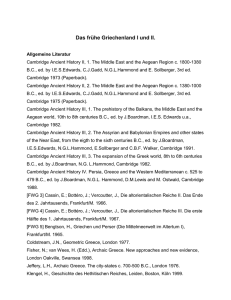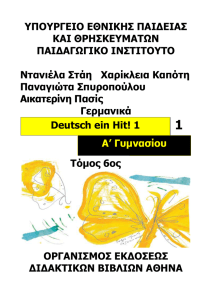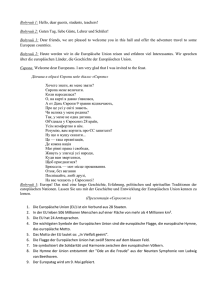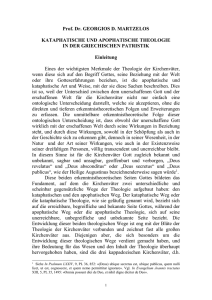Metalanguage 1
Werbung
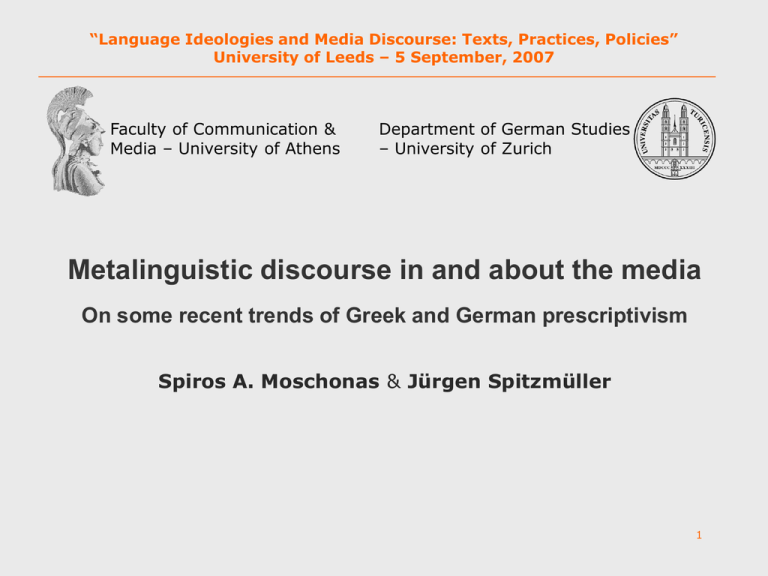
“Language Ideologies and Media Discourse: Texts, Practices, Policies” University of Leeds – 5 September, 2007 Faculty of Communication & Media – University of Athens Department of German Studies – University of Zurich Metalinguistic discourse in and about the media On some recent trends of Greek and German prescriptivism Spiros A. Moschonas & Jürgen Spitzmüller 1 Prescriptivism and purism Delveroudi Rhea & Spiros Moschonas. 2003. «Le purisme de la langue et la langue du purisme», Philologie im Netz 24: 1-26. Moschonas S. 2004. “Relativism in Language Ideology: On Greece’s Latest Language Issues”. Journal of Modern Greek Studies 22.2:173-206. ― 2005. Ιδεολογία και γλώσσα. Athens: Patakis. ― 2007. “Language Issues after the Language Question: On the Modern Standards of Standard Modern Greek”, to appear in Standard Languages and Language Standards: Greek, Past and Present, ed. A. Georgakopoulou and M. Silk. London: King’s College – Centre for Hellenic Studies. Spitzmüller J., 2005. Metasprachdiskurse: Einstellungen zu Anglizismen und ihre wissenschaftliche Rezeption (Linguistik – Impulse & Tendenzen, 11). Berlin / New York: de Gruyter. ― 2005. “Das Eigene, das Fremde und das Unbehagen an der Sprachkultur: Überlegungen zur Dynamik sprachideologischer Diskurse.” Aptum. Zeitschrift für Sprachkritik und Sprachkultur 3: 248–261. ― 2007. “Staking the Claims of Identity: Purism, Linguistics and the Media in post-1990 Germany”. Journal of Sociolinguistics 11.2: 261-285. 2 Why the press? » The press is not just a vehicle, but also a popular target of prescriptivism. » It is often criticized for its bad language use. » It is often blamed as the main propagator of (undesirable) language change – a prototype of bad language use. » Paradoxically, those criticizing the most are among those criticized the most. Critique to (media) language comes mostly from the press, a partly antagonistic medium. Hence, articles in the press are a suitable index for the study of prescriptivism in both the print and the electronic media. 3 Data: Texts in the press about the language of the media Greece » period: 1970 – 2001+ » Corpus: 364 texts (Nov. 99- Jan. 2000) / 10,600 » compiled through a press monitoring agency from 76 newspapers and 102 magazines » no metalinguistic reference excluded » references to media language increase after the privatization of the electronic media (Greek Laws 1730/1987 and 1866/1989) Germany » period: 1990 – 2001+ » Corpus: 1,783 texts » manually compiled from 9 (+42) newspapers and 3 (+9) magazines; » focus on purism – references to spelling reform excluded » concentration of references to media language in the periods 1994 (10) - 1995 (11) and 1999 (15) - 2000 (18) 4 Data: Texts in the press about the language of the media Greece » texts on media language = 80 / 364 (22%) letters to the editor (7) opinion articles [incl. “usage columns”] (34) short comments (11) news articles (21) features (4) interviews (3) Germany » texts on media language = 81 / 1,783 (4.5%) letters to the editor (44) commentaries (23) [= “Glossen” (17) & “Kommentare” (6) ] essays (7) reviews (4) news articles (3) no “usage columns” 5 Prescriptivism: Sets of correctives (Moschonas 2005a) » A corrective is a directive speech act of a metalanguage-to-language direction of fit that has the following form: One should neither say nor write X [prohibitive]; one should say and write Y [normative], because Z [explicative] e.g., one should neither say nor write “αποφασίζω ότι” [to decide that]; one should say and write “αποφασίζω να” [to decide to], because …” (Papazafiri 1991:14-16) e.g., one should neither say nor write “geschockt” [shocked]; one should say and write “schockiert”, because …” (Natorp 1996) 6 Correctives: An example (Greece) “Malapropisms”, newspaper Ethnos X = prohibitive (“we heard: ...”) Z= explicative (“the mistake is: ...”) Y = normative (“the right is:...”) 7 Correctives: An example (Germany) X = prohibitive (“... there Haßwort der Woche is a persisting little fad ...”) Unkosten Süddeutsche Zeitung, 10 August 1996: 15 Da sage noch einer, die deutsche Sprache sei in sich logisch (sagt keiner? äh, egal). Jedenfalls gibt es da eine kleine Marotte, die sich hartnäckig hält und immer wieder heftig zu der Vermutung Anlaß gibt, die Deutschen seien Meister in der Verschleierungstaktik, um nicht zu sagen im Selbstbetrug. Warum sonst setzte man hierzulande vor gewisse Mengenangaben die unauffällige, negierende Vorsilbe un-, auf daß ungemeine Verwirrung herrsche, welche Dimensionen der Anlaß nun angenommen hat? Sind Kosten entstanden? Nein, Unkosten. Welche Mengen lagern? Unmengen, um nicht zu sagen Unmassen, laut Duden bedeutungsgleich mit 'sehr große Menge'. Warum nur, fragt sich der Laie, greift man im Deutschen ausgerechnet zur Verneinung, wenn man, zum Beispiel, etwas ganz Z Gewaltiges = explicative (“... un- is a negating würdigen will? Der Drang ist offensichtlich, vor der – nix prefix [and thus must not be used to eines unscheinbaren Präfixes verstehenden ausländischen – Welt mittels denote anything else, since*] ...”) klein zu machen, was eigentlich sehr groß ist. Muß wohl mitnormative einer Y= unauslotbaren Untiefe im Nationalcharakter zusammenhängen. Wobei (implicit: “don't use presupposition (*“the” German erschwerend hinzukommt, daß eine Untiefe sowohl auf eine 'große Tiefe' theUnding. prefix un- to mark language [ideally] logical in Stelle'. Ein hindeutenshould kann als auch aufbe eine 'seichte a big amount of x”) itself) aw 8 Metalanguage1 and Metalanguage2 (< Silverstein / Preston) Prohibitives + normatives (metalanguage1) } a corrective practice Explicatives } a conceptual scheme, set of beliefs or ideology proper (metalanguage2) » Hypothesis: corrective practices (metalanguages1) vary significantly across languages, periods and linguistic forms (F. Braudel: “courte durée”); on the other hand, conceptual schemes (metalanguages2) tend to be longterm phenomena of wider (even supra-cultural) scope (Braudel: “longue durée”) » German and Greek prescriptivism are characterized by varying corrective practices operating under similar conceptual schemes 9 Metalanguage1: Corrective repertoires (Greece’s NR/TC) * [nominal agreement in archaistic morphology: ‘of theresponsibility. existing “Each one of us should undertake his τις [sic] own «Είναι καιρός ο καθένας να αναλάβει ευθύνες του. Και (masc.) predictions (fem.)’ instead of ‘of phenomena, the existing (fem.) Even some, quite-και frequent, linguistic are μόνον μερικά συχνά επαναλαμβανόμεναγλωσσικά predictions (fem.)’] φαινόμενα, είναιtoαρκετά γιαpublic να ευαισθητοποιήσουν sufficient in order alert the opinion. Thus, weτην often * [nominal agreement archaistic morphology: ‘of the undertaken κοινή Έτσιinακούμε: hear: ...”γνώμη. (masc.) initiatives (fem.)’] * των υπαρχόντων προβλέψεων * [adverbial endings: appropriate ‘archaistic’ ending for ‘probably’] * των αναληφθέντων πρωτοβουλιών * [the Greek αντί expression for ‘sine qua non’, misphrased] * πιθανά πιθανόν * εκ των endings: ουκ άνευ αντί εκ των ων ουκ άνευ * [adverbial appropriate archaistic ending for ‘possibly’] ενδεχόμενα αντί ενδεχομένως * * [adverbial endings: appropriate archaistic ending for ‘previously’] προηγούμενα προηγουμένως * * [an archaistic rule:αντί internal augment in the aoristic imperative is * παρήγγειλε αντί παράγγειλε (προστακτική) prohibited] * εξήτασε αντί εξέτασε * [an archaistic rule: mistaken internal augmentation in aorist] * ασκώ αντί εξασκώ * [phraseοlogy: ‘to exercise’ vs. ‘to practice’] * πραγματεύομαι αντί διαπραγματεύομαι * [phraseology: ‘deal μετοικώ with’ vs. ‘be concerned with’] * μετοικίζω αντί * [phraseology: appropriate archaistic form of ‘to change residence’] * πλησίασε στο σω(ο)ρό (του νεκρού) αντί στη σορό * [orthography: ‘heap, pile’ vs. και ‘corpse’] * η πληροφορία διαρρέει δεν τη διαρρέουν.» *Papakostas [phraseology: ‘the language information leakedby (intrans.)’ vs. ‘they leaked J., “Which is shaped (trans.) the Eleftherotypia information’].19/6/2006 the media”, 10 Metalanguage1: Corrective repertoires (Germany) » [replacing a whole differentiated repertoire ofto expressions “Apart from the problems while getting used things,by theone “Abgesehen von usual den Umstellungsmühen verändert dienew Schreibreform (“wrong”) trendy phrase: ‘davon ausgehen’ (to assume that) instead spelling reform basically changes the Ausdruckskraft appearance (“Schriftbild”). TheSprache hauptsächlich das Schriftbild. Die der deutschen of ‘erwarten’, ‘vermuten’, ‘erhoffen’, ‘unterstellen’, expressive power ‘annehmen’, of the German language does not suffer significantly from leidet unter der Reform nicht wesentlich. Die deutsche Sprache the‘voraussetzen’, reform. The German language is sick due to‘voraussagen’, other reasons. etc.] Thebefindet ‘glauben’, ‘damit rechnen’, sich vielmehr anderen Gründen im loads Krankenstand. Die Diagnose diagnosis is: plural, lack aus of disregarding clarity, inconsistency, of expletives, disregarding » [“wrong” semantic difference: ‘Worte’ instead of lautet: Unklarheit, Widersprüchlichkeit, Anhäufung von[...] Füllwörtern, of grammar. Our responsible institutions refuse a therapy Examples, to (words)] be ‘Wörter’ found day byder dayGrammatik. in any kindUnsere of literature, radio and television:” Mißachtung sprachzuständigen Institutionen » [“wrong” use of reflexive verbs: ‘sich bedanken’ (lit.: to in thank verweigern eine Therapie. [...] Beispiele, täglich zu finden Literatur oneself) instead of ‘danken’ (to thank)] aller Art, Rundfunk und Fernsehen: » [“wrong” and “illogical” phrases: ‘Ich würde sagen’ (I would say) » davon ausgehen. [...] anstelle von erwarten, annehmen, vermuten, instead of ‘Ich sage’ (I say) or Ø] erhoffen, unterstellen, voraussetzen, glauben, damit rechnen, » [disregarding semantic voraussagen etc. [...]. difference: ‘scheinbar’ (seemingly) instead of (obviously)] » ‘anscheinend’ Worte. Die Mehrzahl von Wort heißt Wörter. [...] Worte sind mehrere » [“illogical” ‘lenkfähig’ andSinn ‘abzugsfähig’ instead of Wörter, diemorphology: zusammengenommen einen ergeben. [...] and ‘abziehbar’ (steerable,'bleibt deductable)] » ‘lenkbar’ sich bedanken. Laut Grammatikregel bei (reflexiven Verben) das Geschehenof imconfirmations”: Bereich des Subjekts'. Wer‘echt’, sich bedankt, dankt‘in sich » [“inflation ‘wirklich’, ‘tatsächlich’, deralso Tat’ selbst. [...] (really, truly, indeed) instead of Ø]. » [“wrong” Scheinbar.use Anscheinend (=terms: vermutlich), wissen viele nicht, daß jemand, » of technical ‘x-fach/-mal kleiner’ (x-times der scheinbar schläft, ist (scheinbar = zum Schein). smaller) instead of ‘x wach Prozent’ (x percent), ‘Stundenkilometer’ (lit.: » ‘hour-kilometers’) -fähig. Lenkfähige Autos gibt nicht; sie pro sindStunde’ lenkbar.(km Steuern sind instead ofes ‘Kilometer per hour)]. nicht abzugsfähig, sondern abziehbar. ‘Quantensprung’ […] » [wrong use of technical metaphors: (quantum leap) » for wirklich, in very der Tat. Die move’] Inflation der Bestärkungen a ‘big echt, step’tatsächlich, instead of ‘a small 11 erfordert bald eine Verdoppelung: echt wirklich. […]” Metalanguage1: Tendencies and statistics Greece » X/Y-pairs: 328 (= 4.10/text) token-pairs: 252 (3.15/t) Germany » X/Y-pairs: 239 (= 2.95/text) token-pairs: 221 (2.73/t) type-pairs: 76 (0.95/t) type-pairs: 18 (0.22/t) » X/Ø-references: 162 (2.03/t) » Total: 490 (6.13/t) » X/Ø-references: 388 (4.79/t) » Total: 627 (7.74/t) » Highest concentration: 51 references (Charis 29/1/2000) » Highest concentration: 38 references (Natorp 20/6/1998) 31 x/y-pairs (Charis 29/1/2000) » Lowest concentration: 0 references (34 texts) 23 x/y-pairs (Natorp 6/11/1999) » Lowest concentration: 0 references (7 texts) 12 Metalanguage1: Tendencies and statistics Greece » Lexicon: 98 (20%) foreign words: 30 (6.1%) › English loans: 24 (4.9%) › loans from other languages: 3 (0.6%) › loan translations: 3 (0.6%) marked archaistic forms: 38 (7.8%) marked demotic forms: 17 (3.5%) dialectal: 6 (1.2%) translation of archaisms: 7 (1.4%) Germany » Lexicon: 170 (27.1%) foreign words: 169 (27%) › English loans: 157 (25%) [-11.2%] › loans from other languages: 9 (1.4%) › loan translations: 3 (0.5%) colloquialisms: 1 (0.1%) 13 Metalanguage1: Tendencies and statistics Greece » Discourse/ Pragmatics: 15 (3%) media discourse structure: 13 (2.7%) [+ 21 articles on ‘Greek in the new media’] euphemisms: 1 (0.2%) politeness: 1 (0.2%) Germany » Discourse/ Pragmatics: 210 (33.5%) “overused”/inappropr. used words: 110 (17.5%) metaphors: 64 (10.2%) formulaic expressions: 30 (4.8%) superlatives: 4 (0.6%) fillers: 2 (0.3%) 14 Metalanguage1: Tendencies and statistics Greece » Semantics: 13 (2.7%) obscurity of learned/archaistic forms: 7 (1.4%) semantic differentiation or change: 6 (1.2%) Germany » Semantics: 89 (14.2%) wrongly used foreign words: 29 (4.6%) loss of semantic differentiation: 26 (4.1%) “illogical” semantics: 18 (2.9%) “contaminated” expressions: 9 (1.4%) misapplications of technical terms: 6 (1%) “odd” metaphors: 1 (0.1%) 15 Metalanguage1: Tendencies and statistics Greece » Morphology / Syntax: 199 (45.7%) violation of archaistic rules: 27 (5.5%) agreement / attraction: 12 (2.4) demotic adv. ending (-α): 29 (6%) stress mov. in declension: 25 (5.1%) wrong affix: 36 (7.3%) augmented imperative: 6 (1.2%) prep + relative clause: 1 (0.2%) nouns with no plural / sing.: 60 (12.2%) loan adaptation: 25 (5.1%) mixed (Greek-foreign) compounds: 2 (0.4%) foreign word morphology: 1 (0.2%) » Phraseology: 29 (5.9%) formulaic expr.: 21 (4.3%) αφορά (σε) [to concern / be about]: 8 (1.6%) Germany » Morphology / Syntax: 113 (18%) wrong inflection: 43 (6.9%) wrong prepositions: 15 (2.4%) agreement: 3 (0.5%) code-switching: 3 (0.5%) word order: 2 (0.3%) wrong conjunction: 1 (0.1%) wrong tense (“foreign” syntax): 1 (0.1%) “illogical” morphology: 34 (5.4%) foreign word morphology: 11 (1.8%) » Phraseology: 25 (4%) foreignisms: 25 (4%) 16 Metalanguage1: Tendencies and statistics Greece » Orthography: 75 (15.3%) for/against monotonic: 5 (1%) vs. 4 (0.8%) for/against Roman script (in some registers): 3 (0.6%) vs. 10 (2%) loan transliteration: 7 (1.4%) “final –ν” rule (assimilation): 5 (1%) CC clusters (dissimilation): 1 (0.2%) punctuation: 2 (0.4%) misspellings: 38 (7.8%) Germany » Orthography: 13 (2%) spelling reform*: 9 (1.4%) spelling of loanwords: 1 (0.1%) misc.: 3 (0.5%) (*consider corpus constraints!) 17 Metalanguage1: Tendencies and statistics Greece Germany » Miscellaneous: 25 (5.1%) » Miscellaneous: 22 (3.5%) pronunciation: 2 (0.4%) pronunciation of loans: 7 (1.4%) false etymologies: 6 (1.2%) blunders/boners: 10 (2%) » loans: 62 (12.7%) » diglossia: 158 (32.2%) pronunciation: 1 (0.1%) pronunciation of loans: 9 (1.4%) typos: 12 (2%) » loans: 254 (40.5%) » orthography: ? 18 Metalanguage1: Tendencies and statistics 50 40 GREECE 20 GERMANY 10 Le is xi c. co -P n ra gm at ic S s em M an or tic ph s .S yn ta Ph x ra se ol O og rt ho y gr ap M hy is * ce lla ne ou s 0 D (%) 30 (*consider corpus constraints!) 19 Metalanguage1: Recent trends of Greek and German prescriptivism Greece » Diglossia: demotic vs. archaistic/puristic variety (two standards) » Restandardization: Standard Modern Greek = demotic + archaisms internal purism external purism » “Grammatical” model “phraseological” model: “comprehensive” “etymological” “conventional” “internal” Germany » Long prescriptive tradition (standardization) » Restandardization: purism against Anglicisms spelling reform: battle for the right to prescribe (cf. Johnson 2005) » “Grammatical” model “semantic” model: “comprehensive” “etymological” “logical” “external” 20 Metalanguage1: Shared presuppositions » Presuppositions of correctives: variation of X and Y awareness of X and Y variation is “transitional” correctives raise awareness of X and Y through X/Y, with the aim of replacing X by Y. » Variation is not the “normal case” (as in sociolinguistics); rather, it is a “transitional” stage between two exclusive uses (X or Y) – a motion in a pendulum. Could correctives prove felicitous under particular circumstances? Could an increase in awareness of X/Y in favour of Y stop the pendulum swinging towards X? 21 Metalanguage2: Media language as a model (Greece) “the media language is [should be] exemplary in both expression and structure” media language as a model 22 Metalanguage2: Media language as a model (Germany) “Without question, institutions and persons who die “Unbestreitbar ist, daßthose diejenigen Institutionen und Personen, der Bevölkerung mit ihren schablonenhaft pester the peoplejeden everyTag day with their stereotyped formulierten Sätzen den Ohren liegen, sentences bear the in responsibility for Verantwortung the describeddafür tragen, daß sich die so wie beschrieben wandelt. Denn language change. ForSprache the masses follow these leading nach diesen Leitfiguren richtet sich die Masse. Was etwa figures .” Politiker von sich geben und Fernsehen und Rundfunk dann Millionen von Haushalten vermitteln, wird dort aufgesogen, media as Wenn a model weiterverbreitet und language weitergegeben. aus dem Lautsprecher stets nur ‘erneut’ ertönt und die vielen anderen Möglichkeiten wie wiederum, abermals, ein weiteres “People in millions of households will absorb whatMal, noch einmal, aufs vernachlässigt politicians, forneue instance, say and werden, what TVbleibt and eben radioam Ende nur ‘erneut’and übrig [...].” broadcast, they will(Natorp spread1991) it further. If the loudspeaker always outputs ‘erneut’ [again] and all the many other possibilities like ‘wiederum’, ‘abermals’, ‘ein weiteres Mal’, ‘noch einmal’, ‘auf neue’ are disregarded, only ‘erneut’ will remain at the end.” 23 Metalanguage2: Media language as a model (Greece’s NR/TC) «…τα μέσα, αν και δεν αποτελούν έναν από τους θεσμοθετημένους φορείς γλωσσικής αγωγής, εν τούτοις ο ρόλος είναιmedia “the roleτους of the είναι is καθοριστικός. decisive [...]Και because καθοριστικός, γιατί the media provide μπορούν και αποτελούν language models” πρότυπα γλωσσικά. Διαμορφώνουν στάσεις, ιδεολογίες, συνειδήσεις και με τον έναν ή τον άλλο τρόπο παρεμβαίνουν στην καθημερινή ζωή του media language τηλεθεατή.» as a model «…ένα συνέδριο με θέμα “fines on those who violate language” “Ελληνική γλώσσα και ΜΜΕ”. Στο συνέδριο αυτό […] θα ετίθετο δημοσίως το σοβαρό αυτό πρόβλημα […], αφού οι ποικίλες “the various instructions, παρεμβάσεις, οι οδηγίες δηλαδή και άλλες guidelines and fines παρεμφερείς υποδείξεις issued by NR/TC have had του ΕΣΡ -ακόμη και absolutely no effect so ποινές- δεν είχαν το παραμικρό far” αποτέλεσμα.» Papakostas, ibid. [Call for NR/TC’s 2007 conference] 24 Metalanguage2: Media language as a model (Germany) “However, we zu need to differentiate. InPrivaten private, inaccuracies and, if “Aber es gilt unterscheiden. Im sind need be, the simple twaddle are thedas oil that starts Gewäsch conversation or Ungenauigkeiten und notfalls schlichte keeps it going. When it comes toinpublic however, Gleitmittel, die Gespräche Gangspeech setzendiarrhoea, oder halten. things areanders completely civil Völlig liegtdifferent. der Fall, […] wo Politicians, es um denleading öffentlichen servants, economy leaders, journalists andSpitzenbeamte, others who participate Sprechdurchfall geht. [...] Politiker, in Wirtschaftsführer, the big public discourse all bear a particular responsibility for Journalisten und andere, die am großen accuracy, truth and time-economic use of language. Inhaben other eine gesellschaftlichen Gespräch mitwirken, sie alle words: it is up Verantwortung to them whetherfür we Exaktheit, [all] end upWahrheit saying nothing besondere und through talking and writing.” zeitökonomische Verwendung von Sprache. Mit anderen Worten: Sie entscheiden, ob wir eines Tages redend oder schreibend nichts mehr sagen.” (Großkopff 1997) publicity ↔ norm “Es sollte selbstverständlich sein, infringements daß diejenigen, die sich in Wort oder Schrift artikulieren, die Regeln der Hochsprache beherrschen und beachten – privat kann jeder reden, wie derbe Schnabel ist.” (Jastrow 1994) orally or “Itihm should a matter gewachsen of course that those who articulate in writing know and follow the norms of the standard language – in private, anyone is free to talk as s/he likes.” 25 Metalanguage2: Shared presuppositions about language » languages are homogeneous and distinct, separable entities » languages are internally logical and precise » languages are stable » the only “real” function of language is denotation » variation (without variation in denotation) is a transitional stage (metalanguage1) Purism » Conforms to the “Herderian concept of language” (Gal 2006: 14 ff.) → long tradition and supra-cultural scope 26 Metalanguage2: Shared presuppositions about media language 0. Since languages are homogeneous, distinct, logical, precise and stable, there is also one and only one language (“the” language) of the media, which itself is homogeneous, distinct, logical, precise and stable. “This” one and only language of the media (Re-)standardization 1. is/should be standard; it models language usage; 2. has to be monitored carefully: high publicity requires low tolerance with regard to infringements to “the” norm; 3. can be evaluated by ideals of transparency, logicality and standardness that contradict actual media usage; it can be corrected mechanically (by ‘proofreaders’ or ‘professionals’); 4. it is influential, i.e., it affects language change. 27 Studies asserting that media affect language change (Brazil’s Portuguese) » Ana Maria Carvalho (Uruguay’s Portuguese) » Rudolph Muhr (Austria’s German) » Jane Stuart-Smith » Jannis Androutsopoulos (Immigrants’ German) conv. substandard (Glaswegian) convergence to a standard language » Anthony Naro & Maria Scherre Susan C. Herring, ed., 2003. Media and Language Change, special issue of Journal of Historical Pragmatics 4.1 28 Conclusions 1. 2. 3. 4. 5. 6. In metalanguage1, purism manifests itself as a collective linguistic practice. In metalanguage2, purism manifests itself as the most general conceptual/ideological presupposition of media discourse about the discourse of the media. Metalanguage1 is based on the presupposition that variation is a transitional, exceptional state, unless it conforms with “variation” in denotation. For prescriptivists, the main function of media language is to serve as a model of “the” language. The same conceptual scheme explains the differences as well as the similarities between Greek/German prescriptivism. While linguistic practices vary, language ideologies are longterm, supra-cultural phenomena. Could the same conceptual scheme also explain differences (as well as similarities) between prescriptivists and descriptivists? 29 References Androutsopoulos Jannis. 2001a. “From the Streets to the Screens and Back Again: On the Mediated Diffusion of Variation Patterns in Contemporary German”. LAUD Linguistic Agency, Series A: No. 522. Universität Essen. — 2001b. “Ultra korregd Alder! Zur medialen Stilisierung und Popularisierung von ‘Türkendeutsch’”. Deutsche Sprache 4: 321-339. — 2005). “...und jetzt gehe ich chillen: Jugend- und Szenesprachen als Erneuerungsquellen des Standards”, in Standardvariation, ed. Ludwig Eichinger & Kallmeyer Werner. Berlin / New York: de Gruyter: 171-206. AW. 1996. “Haßwort der Woche: Unkosten”. Süddeutsche Zeitung (10 Aug). Braudel Fernand. 1969. « Histoire et sciences sociales: La longue durée », in Écrits sur l’histoire. Paris: Flammarion. 41–83. Babiniotis George. 1999. «Τα θετικά και αρνητικά για τη γλώσσα» [“Positive and negative aspects of (Media) Language”]. Ethnos (29 Nov). Carvalho Ana Maria. 2004. “I Speak like the Guys on TV: Palatalization and the Urbanization of Uruguayan Portugese”. Language Variation and Change 16, 127-151. Charis Jannis I. 2000. «Αυτοί και οι εαυτοί τους» [“Them and Themselves”]. Ta Nea (29 Jan). 30 References (cont.) Delveroudi Rhéa & Spiros Moschonas. 2003. «Le purisme de la langue et la langue du purisme». Philologie im Netz 24: 1-26. Gal Susan. 2006. “Migration, Minorities and Multilingualism: Language Ideologies in Europe”, in Language Ideologies, Policies and Practices – Language and the Future of Europe (Language and Globalization), ed. C. Mar-Molinero & P. Stevenson. Houndsmill: Palgrave MacMillan. 13–27. Großkopff Klaus. 1997. “Überall Blähdeutsch. Ob in der Werbung oder in TalkShows – es purzeln die Worte, die eigentlich gar nichts sagen”. Das Sonntagsblatt (28 Feb). Herring Susan C., ed. 2004. Media and Language Change. Special issue of Journal of Historical Pragmatics 4.1. Höfert Joachim. 2000. “Schlamperei”. Frankfurter Rundschau (20 May). Illgner Gerhard. 2001. Letter to the editors [no title]. Die Zeit (22 Mar). Jäger Rudolf. 1994. “Wider die Verschandlung”. Badische Zeitung (13 Aug). Jastrow Otto. 1994. “Nicht wie die modischen Politlinguisten”. Frankfurter Allgemeine Zeitung (22 Mar). Johnson Sally. 2005. Spelling Trouble? Language, Ideology and the Reform of German Orthography. Clevedon: Multilingual Matters. 31 References (cont.) Krystek-Theissen Ulrike. 1994. “Sprachpflege beim Abitur”. Frankfurter Allgemeine Zeitung (22 Mar). Moschonas Spiros. 2004. “Relativism in Language Ideology: On Greece’s Latest Language Issues”. Journal of Modern Greek Studies 22.2:173-206. — 2005a. “On the Performative Character of Language Ideologies”. Paper read at the 9th Int. Pragmatics Conference (Riva del Garda, Italy, 10-15 July 2005). — 2005b. Ιδεολογία και γλώσσα [Ideology and Language]. Athens: Patakis. — 2007. “Language Issues after the Language Question: On the Modern Standards of Standard Modern Greek”, to appear in Standard Languages and Language Standards: Greek, Past and Present, ed. A. Georgakopoulou & M. Silk. London: King’s College – Centre for Hellenic Studies. Muhr Rudolf. 2003. “Language Change via Satellite: The Influence of German Television Broadcasting on Austrian German”. Journal of Historical Pragmatics 4.1: 103–127. Naro Anthony J. A. 1981. “The Social and Structural Dimensions of Syntactic Changes”. Lingua 57: 63-69. Naro Anthony J. A. & Maria Marta Pareira Scherre. 1996. “Contact with Media and Linguistic Variation”, in Sociolinguistic Variation: Data, Theory, and Analysis, ed. J. Arnold et al. Stanford: CSLI. 223-228. 32 References (cont.) Natorp Klaus. 1991. “Lebendige Sprache?” Frankfurter Allgemeine Zeitung (30 Jul). Natorp, Klaus. 1996. “Verarmt und verwildert. Kleines Lamento über den Umgang mit der Sprache”. Frankfurter Allgemeine Zeitung (3 Aug). Natorp Klaus. 1998. “Jeden Tag dieselbe fade Sauce, gnadenlos. Wie der Wortschatz der deutschen Sprache immer mehr zusammenschrumpft”. Frankfurter Allgemeine Zeitung (20 Jun). Natorp Klaus. 1999. “Alles auf dem Prüfstand. Klagelied über die tägliche Sprachschändung”. Frankfurter Allgemeine Zeitung (6 Nov). Papazafiri Ioanna. 1991. «‘Αποφασίζω … ότι’». Ta Nea (2 March). Papakostas, Jannis. 2006. «Τι γλώσσα διαμορφώνουν τα ΜΜΕ» [“Which Language is Shaped by the Media”]. Eleftherotypia (19 Jun). Silverstein Michael. 1979. “Language Structure and Linguistic Ideology”, in The Elements: A Parasession on Linguistic Units and Levels, ed. P. Clyne, W. Hanks & C. Hofbauer. Chicago: Chicago Linguistic Society. 193-247. — 1993. “Metapragmatic Discourse and Metapragmatic Function”, in Reflexive Language: Reported Speech and Metapragmatics, ed. J. A. Lucy. Cambridge: Cambridge University Press. 33-58. 33 References (cont.) Stuart-Smith Jane. 2005. Is television a contributory factor in accent change in adolescents? Final Report on ESRC Grant No. R000239757 [http://www.arts.gla.ac.uk/SESLL/EngLang/phonetics/contributory/index .html]. Preston Dennis R. “Folk Metalanguage”, in Metalanguage: Social and Ideological Perspectives, ed. A. Jaworski, N. Coupland & D. Galasiński. Berlin New York: de Gruyter. 75-101. Spitzmüller Jürgen. 2005. Metasprachdiskurse: Einstellungen zu Anglizismen und ihre wissenschaftliche Rezeption (Linguistik – Impulse & Tendenzen, 11). Berlin / New York: de Gruyter. — 2005. “Das Eigene, das Fremde und das Unbehagen an der Sprachkultur: Überlegungen zur Dynamik sprachideologischer Diskurse.” Aptum. Zeitschrift für Sprachkritik und Sprachkultur 3: 248–261. — 2007. “Staking the Claims of Identity: Purism, Linguistics and the Media in post-1990 Germany”. Journal of Sociolinguistics 11.2: 261-285. Werner, Ulrich. 1996. “Die deutsche Sprache bedarf völlig anderer Reformen”. Süddeutsche Zeitung (26 Oct). 34
